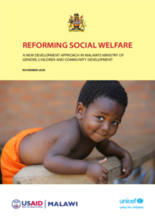Summary
Despite its importance to the poorest in society, the social welfare sector in Malawi has not been performing well. Recognising this, the Principal Secretary (PS) in the Ministry of Gender, Children and Community Development (MoGCCD) requested support from United Nations Children’s Fund (UNICEF) and United States Agency for International Development (USAID), who have taken a new approach: supporting the Government of Malawi (GoM) to build a better social welfare system starting at the top, within the Ministry. Using organizational development techniques, consultants have led the Ministry through a process of self-analysis towards significant institutional change. The successful process of change described here emerged piecemeal and relied heavily on the determination of particular individuals, but there is no reason why the approach should not be replicated elsewhere, provided that organizational development specialists are brought in to guide the process from the outset.
Reform within the MoGCCD became possible with the appointment of a new PS in 2007, and continued with the full support of the Minister. In line with her aim to improve performance throughout the Ministry, UNICEF and USAID supported a thorough review of its human capacity in early 2008. Based on the human resource capacity building plan that was developed, the Ministry was able to mobilize MK 70 million (US$ 490,000) from the central government for infrastructure upgrade at Magomero Training College. Several staff positions at the Ministry were also upgraded. But despite these encouraging achievements, much work still needed to be done.
A management retreat for senior staff within the Ministry, led by organizational development consultants, was held in November 2008. This carefully structured event led to evident changes in cooperation between Ministry staff, and offered hope that improvement at the highest levels was indeed possible.
The next task was to revise all job descriptions within the Ministry, and to develop career paths and a training strategy. By this time, there was growing enthusiasm among Ministry staff for the process of reform, but two things became apparent: the PS would need the formal support of committed senior leaders if reform was to continue beyond her tenure; and many Ministry staff did not have the qualifications required by the new job descriptions.
To address the first, a series of leadership retreats was held and a Senior Leadership Group (SLG) formed. To deal with the second, a detailed training needs assessment was carried out. And, as the leadership retreats had highlighted poor accountability and transparency in managing resources, the Ministry’s financial management systems are being given technical support. Support is also being given to introduce a computerised human resource records system.
At this point, it was felt that the Ministry had made good progress on the road to self-reform which would ultimately allow it properly to support its district staff and structures throughout Malawi. So, having put the Ministry on an increasingly sound footing, support from USAID and UNICEF then focused on how to improve capacity of frontline staff. It was already recognized that Magomero College, where most District Social Welfare Officers (DSWO) are trained, was not fit for purpose. A report was commissioned to assess its current state and set out how it could be upgraded to university level. The Ministry now has a Task Force looking at the upgrade process, which is scheduled to take a maximum of three years.
As a partial and immediately available option for staff training, the Open Distance Learning Programme run by Kwa Zulu Natal University was piloted on a limited scale. So far, results are encouraging, and a new 18-month course will start in July 2011.
In terms of immediate action, the newly galvanized Ministry is set, with donor support, to improve its services to protect vulnerable children and families. Capacity building will include many related elements and will focus on a holistic package of support.
In conclusion, it appears that organizational change at the highest level can reform social welfare. A properly engaged ministry can offer support to district structures that result in lasting improvements. Conversely, until change is seen at ministry level, there is no guarantee that the benefits of donor support will be felt by those who need it most.

